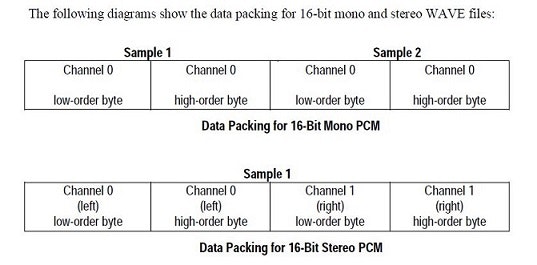はじめに
Waveform Audio File Format(WAV)について説明します。
Pulse-code modulation(PCM) を保存できます。次のDocumentに定義されています。
Multimedia Programming Interface and Data Specifications [1]
Format
Header
header を C の struct で表記します。
FormType = "WAVE" の RIFFです。ID = "fmt " と "data" の chunkを持ちます。
struct wav_header {
uint8_t ChunkID[4]; // "RIFF"
uint32_t ChunkSize; // 4 + (8 + SubChunkFmtSize(16)) + (8 + SubChunkDataSize)
uint8_t FormType[4]; // "WAVE"
uint8_t SubChunkFmtID[4]; // "fmt "
uint32_t SubChunkFmtSize; // 16
# define LPCM (1)
uint16_t FormatTag; // 1:LPCM
# define MONO (1)
# define STEREO (2)
uint16_t Channels;
# define RATE48KHZ (48000)
uint32_t SamplesPerSec;
uint32_t AvgBytesPerSec; // SamplesPerSec * Channels * BitsPerSample / 8
uint16_t BlockAlign; // Channels * BitsPerSample / 8
# define BPS16BIT (16)
uint16_t BitsPerSample; // 16
uint8_t SubChunkDataID[4]; // "data "
uint32_t SubChunkDataSize; // NumSamples * Channels * BitsPerSample / 8
} __attribute__((packed));
Data
headerの後ろにPCMデータが続きます。Channel毎にSample数分 連続して続きます。
[1]から図を抜粋します。
Code example
sine の wav を生成する例を示します。mono / 48kHz です。
makefile
CFLAGS=-I. -Wall -Werror -O2 -march=native
INCS=
OBJS=test.c
LIBS=
TARGET=test
all: $(TARGET)
%.o: %.c $(INCS)
$(CC) $(CFLAGS) -c -o $@ $<
$(TARGET): $(OBJS)
$(CC) $(CFLAGS) -o $@ $^ $(LIBS)
clean:
rm -rf $(TARGET) *.o
test.c
# include <inttypes.h>
# include <math.h>
# include <stdio.h>
# include <stdlib.h>
struct wav_header {
uint8_t ChunkID[4]; // "RIFF"
uint32_t ChunkSize; // 4 + (8 + SubChunkFmtSize(16)) + (8 + SubChunkDataSize)
uint8_t FormType[4]; // "WAVE"
uint8_t SubChunkFmtID[4]; // "fmt "
uint32_t SubChunkFmtSize; // 16
# define LPCM (1)
uint16_t FormatTag; // 1:LPCM
# define MONO (1)
# define STEREO (2)
uint16_t Channels;
# define RATE48KHZ (48000)
uint32_t SamplesPerSec;
uint32_t AvgBytesPerSec; // SamplesPerSec * Channels * BitsPerSample / 8
uint16_t BlockAlign; // Channels * BitsPerSample / 8
# define BPS16BIT (16)
uint16_t BitsPerSample; // 16
uint8_t SubChunkDataID[4]; // "data "
uint32_t SubChunkDataSize; // NumSamples * Channels * BitsPerSample / 8
} __attribute__((packed));
struct wav_header wav_template = {
"RIFF", // uint8_t ChunkID[4];
0, // uint32_t ChunkSize;
"WAVE", // uint8_t FormType[4];
"fmt ", // uint8_t SubChunkFmtID[4];
16, // uint32_t SubChunkFmtSize;
LPCM, // uint16_t FormatTag;
MONO, // uint16_t Channels;
RATE48KHZ, // uint32_t SamplesPerSec;
RATE48KHZ*MONO*BPS16BIT/8, // uint32_t AvgBytesPerSec;
MONO*BPS16BIT/8, // uint16_t BlockAlign;
BPS16BIT, // uint16_t BitsPerSample;
"data", // uint8_t SubChunkDataID[4];
0, // uint32_t SubChunkDataSize;
};
double chirp(int x, int N, double sf /*sampling_frequency*/, double fs, double fe, double A /*amplitude*/)
{
double k = (fe - fs) / (double)N;
return A * sin(2.0 * M_PI / sf * (fs*(double)x + k/2.0 * (double)x * (double)x));
}
/* (write size) = N * sizeof(int16_t) */
void create_and_write_data(FILE* fp, int N, double fs /* start frequency*/, double fe /* end frequency*/, double A /*amplitude*/)
{
int i;
size_t ret;
for (i=0; i<N; i++) {
int16_t s = (int16_t)round(chirp(i, N, (double)RATE48KHZ, fs, fe, A));
ret = fwrite(&s, 1, sizeof(s), fp);
if (ret != sizeof(s)) {
printf("error fwrite %d\n", __LINE__);
return;
}
}
}
void usage()
{
printf("usage:\n");
printf(" test [fs] [fe] [A] [N]\n");
}
int main(int argc, char* argv[])
{
int fs, fe, A, N;
size_t ret;
FILE* fp;
if (argc != 5) {
usage();
return -1;
}
fs = atoi(argv[1]);
fe = atoi(argv[2]);
A = atoi(argv[3]);
N = atoi(argv[4]);
printf("fs=%d fe=%d A=%d N=%d\n", fs, fe, A, N);
fp = fopen("test.wav", "wb");
if (fp == NULL) {
printf("error fopen\n");
return -1;
}
wav_template.SubChunkDataSize = N * sizeof(int16_t);
wav_template.ChunkSize = 36 + wav_template.SubChunkDataSize;
// header
ret = fwrite(&wav_template, 1, sizeof(wav_template), fp);
if (ret != sizeof(wav_template)) {
printf("error fwrite %d\n", __LINE__);
return -1;
}
// data
create_and_write_data(fp, N, (double)fs, (double)fe, (double)A);
fclose(fp);
return 0;
}
console
$ gcc --version
gcc.exe (Rev2, Built by MSYS2 project) 6.2.0
$ make clean && make
rm -rf test *.o
cc -I. -Wall -Werror -O2 -march=native -o test test.c
$ ./test.exe
usage:
test [fs] [fe] [A] [N]
$ ./test.exe 20 20000 30000 480000
fsは始めの周波数です。feは終わりの周波数です。Aは振幅です。Nはデータ数です。
fs = feであれば単一のsineを生成します。 fs < feであれば周波数を変化させます。
WAV Fileを出力する
WAV Fileを出力する例を示します。
test.c
# include <inttypes.h>
# include <stdio.h>
struct wav_header {
uint8_t ChunkID[4]; // "RIFF"
uint32_t ChunkSize; // 4 + (8 + SubChunkFmtSize(16)) + (8 + SubChunkDataSize)
uint8_t FormType[4]; // "WAVE"
uint8_t SubChunkFmtID[4]; // "fmt "
uint32_t SubChunkFmtSize; // 16
# define LPCM (1)
uint16_t FormatTag; // 1:LPCM
# define MONO (1)
# define STEREO (2)
uint16_t Channels;
# define RATE48KHZ (48000)
uint32_t SamplesPerSec;
uint32_t AvgBytesPerSec; // SamplesPerSec * Channels * BitsPerSample / 8
uint16_t BlockAlign; // Channels * BitsPerSample / 8
# define BPS16BIT (16)
uint16_t BitsPerSample; // 16
uint8_t SubChunkDataID[4]; // "data "
uint32_t SubChunkDataSize; // NumSamples * Channels * BitsPerSample / 8
} __attribute__((packed));
void usage()
{
printf("usage:\n");
printf(" test [file_name]\n");
}
int main(int argc, char* argv[])
{
FILE* fp;
char* file_name;
struct wav_header hd;
if (argc != 2) {
usage();
return -1;
}
file_name = argv[1];
fp = fopen(file_name, "rb");
if (fp == NULL) {
printf("error fopen\n");
return -1;
}
// read header
if (fread(&hd, 1, sizeof(hd), fp) != sizeof(hd)) {
printf("error fread header\n");
return -1;
}
printf("FormatTag %d\n", hd.FormatTag);
printf("Channels %d\n", hd.Channels);
printf("SamplesPerSec %d\n", hd.SamplesPerSec);
printf("BitsPerSample %d\n", hd.BitsPerSample);
while (!feof(fp)) {
int i;
for (i=0; i<hd.Channels; i++) {
int16_t sample = 0;
fread(&sample, 1, 2, fp);
printf("%d %+05d\n", i, sample);
}
}
fclose(fp);
return 0;
}
console
$ ./test.exe ./test.wav | head
FormatTag 1
Channels 1
SamplesPerSec 48000
BitsPerSample 16
0 +0000
0 +0079
0 +0157
0 +0236
0 +0315
0 +0395
...
